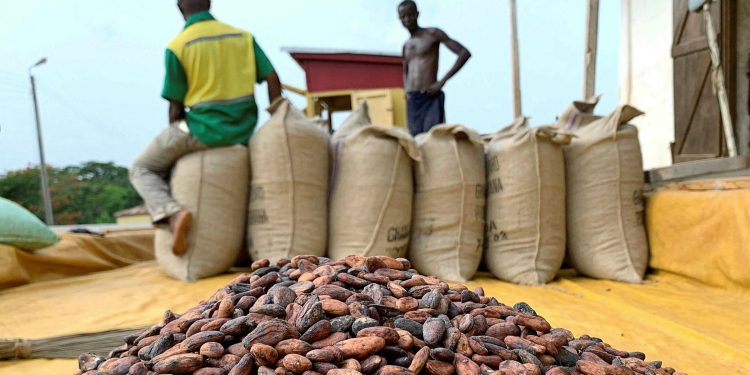Cocoa farmers in Ghana can heave a sigh of relief as the European Union (EU) has clarified that the majority of cocoa from the West African country is at no risk of an EU market ban.
Legislation passed in December by the EU parliament seeks to ban some commodities linked to deforestation, including cocoa, coffee, soya and beef.
Cocoa production is tagged as the leading cause of deforestation in West Africa, a region responsible for two-thirds of global cocoa beans output.
Ghana exports more than 80 percent of its annual cocoa output to the European Union. Fears are that hundreds of thousands of smallholder cocoa farmers in Ghana would be left destitute if the EUDR came into force.
But interacting with members of the Ghana Civil-society Cocoa Platform (GCCP) during his recent visit to Accra, the EU Director General for International Partnerships (INTPA), Regis Meritan (PhD), said such concerns are unfounded.
Dr. Meritan explained that when implementation of the law commences in two years, it will only apply to produce from cocoa farms established after December 2020 and not those existing before. “The objective of this law in Europe is to say thanks to our law we are stopping deforestation. As for what happened before the law started, leading to deforestation, it is too late,” he underscored.
The INTPA chief further clarified, “So, what we want is to not encourage new deforestation”.
Ghana is the second-largest producer of cocoa beans globally after its neighbour Cote d’Ivoire. More than 800,000 farmer-families account for its output. The country’s annual production has averaged 800K metric tonnes in the last decade, with most of it exported in a raw state to the EU and other markets.
With local value addition capacity almost non-existent, cocoa growers are apprehensive that a ban on Ghana cocoa from the EU market would inflict unimaginable hardship on them. “Even without a ban, cocoa farmers are living in squalor due to low international market and farmgate prices for our harvests,” complained Leticia Yankey, President of Cocoa Mmaa – a female-only cocoa farmer cooperative in Ghana’s Central Region.
But Regis Meritan strongly allayed the fears of cocoa farmers in both Ghana and Ivory Coast regarding any adverse impact of the EUDR on their livelihoods. “I do not think the regulation on deforestation will have a major impact on your ability to continue selling your cocoa and your cocoa being imported into Europe,” Dr. Meritan assured.
“I am not talking about 100 percent of your production, but I think if we are talking about 98 or 95 percent of your production I would probably be right,” he stated.
The European Union DG for International Partnerships insisted that: “The main problem that could happen is more probably linked to your own legislation than this new criterion applied by the EU after 2020”.
According to him although the majority of cocoa farms in Ghana pre-date the EUDR cut-off date of December 2020, the designation of such farmlands by Ghanaian law as protected areas could be problematic.



